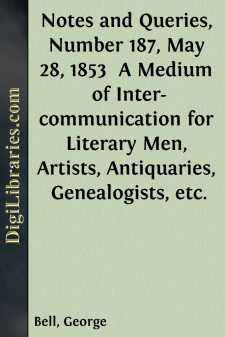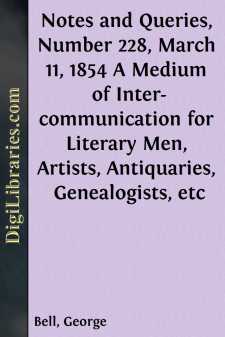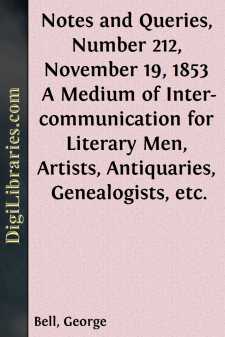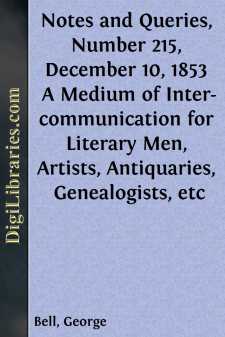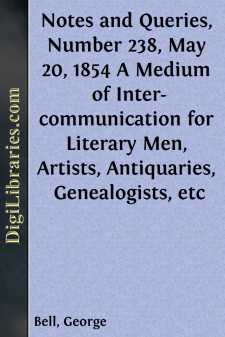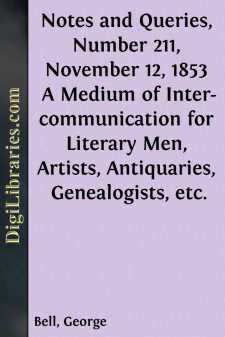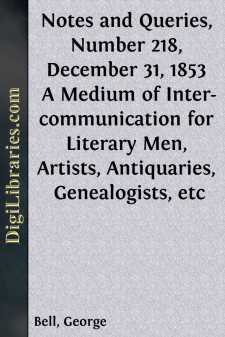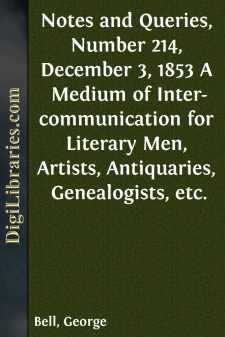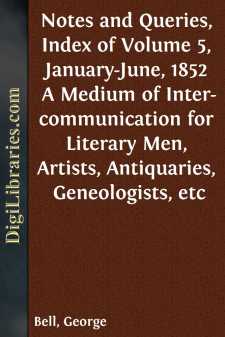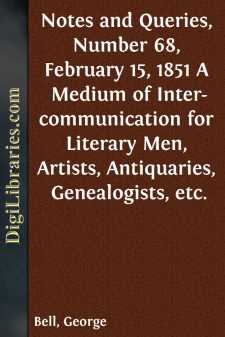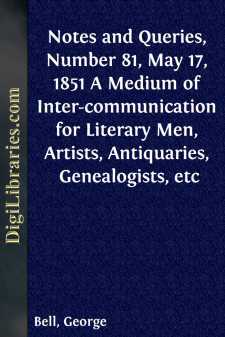Categories
- Antiques & Collectibles 13
- Architecture 36
- Art 48
- Bibles 22
- Biography & Autobiography 813
- Body, Mind & Spirit 142
- Business & Economics 28
- Children's Books 17
- Children's Fiction 14
- Computers 4
- Cooking 94
- Crafts & Hobbies 4
- Drama 346
- Education 46
- Family & Relationships 57
- Fiction 11829
- Games 19
- Gardening 17
- Health & Fitness 34
- History 1377
- House & Home 1
- Humor 147
- Juvenile Fiction 1873
- Juvenile Nonfiction 202
- Language Arts & Disciplines 88
- Law 16
- Literary Collections 686
- Literary Criticism 179
- Mathematics 13
- Medical 41
- Music 40
- Nature 179
- Non-Classifiable 1768
- Performing Arts 7
- Periodicals 1453
- Philosophy 64
- Photography 2
- Poetry 896
- Political Science 203
- Psychology 42
- Reference 154
- Religion 513
- Science 126
- Self-Help 84
- Social Science 81
- Sports & Recreation 34
- Study Aids 3
- Technology & Engineering 59
- Transportation 23
- Travel 463
- True Crime 29
Notes and Queries, Number 187, May 28, 1853 A Medium of Inter-communication for Literary Men, Artists, Antiquaries, Genealogists, etc.
by: George Bell
Categories:
Description:
Excerpt
ON CHAUCER'S KNOWLEDGE OF ITALIAN.
In the Memoir prefixed to the Aldine edition of the Poetical Works of Chaucer, London, 1845, Sir Harris Nicolas expresses an opinion that Dan Geoffrey was not acquainted with the Italian language, and therefore not versed in Italian literature.
"Though Chaucer undoubtedly knew Latin and French, it is by no means certain, notwithstanding his supposed obligations to the Decameron, that he was as well acquainted with Italian. There may have been a common Latin original of the main incidents of many, if not of all the tales, for which Chaucer is supposed to have been wholly indebted to Boccaccio, and from which originals Boccaccio himself may have taken them. That Chaucer was not acquainted with Italian may be inferred from his not having introduced any Italian quotation into his works, redundant as they are with Latin and French words and phrases."—Life of Chaucer, pp. 24, 25.
To which the following note is subjoined:
"Though Chaucer's writings have not been examined for the purpose, the remark in the text is not made altogether from recollection, for at the end of Speght's edition of Chaucer's Works, translations are given of the Latin and French words in the poems, but not a single Italian word is mentioned."
If Sir Harris Nicolas had examined the writings of Chaucer with any care, he would scarcely have formed or expressed so strange an opinion, for he must necessarily have discovered that Chaucer was not only well acquainted with the language, but thoroughly well versed in Italian literature, and that he paraphrased and translated freely from the works of Dante, Petrarca, and Boccaccio. Chaucer would naturally quote Latin and French, as being familiar to his cotemporaries, and would abstain from introducing Italian, as a knowledge of that language must have been confined to a few individuals in his day; and he wrote for the many, and not for the minority.
The circumstances of Chaucer's life, his missions to Italy, during which he resided several months in that country, when sent on the king's business to Genoa, and Florence, and Lombardy, afforded him ample opportunities of becoming thoroughly acquainted with the language and literature of Italy; the acquisition of which must have been of easy accomplishment to Chaucer, already familiar with Latin and French. So that it is not necessary to endow Chaucer "with all human attainments as proof of his having spoken Italian."
Chaucer's own writings, however, afford the strongest evidence against the opinion entertained by Sir Harris Nicolas, and such evidence as cannot be controverted.
Chaucer loves to refer to Dante, and often translates passages from the Divine Comedy. The following lines are very closely rendered from the Paradiso, xiv. 28.:—
"Thou one, two, and thre, eterne on live,
That raignest aie in thre, two, and one,
Uncircumscript, and all maist circumscrive."
Last stanza of Troilus and Creseide.
"Quell' uno e due e tre che sempre vive,
E regna sempre in tre e due ed uno,
Non circonscritto, e tutto circonscrive."
Dante, Il Paradiso, xiv....


